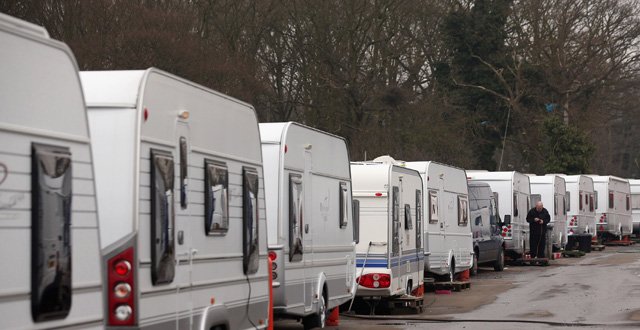
The mental health needs of the Irish Traveller community are both under-recognised and urgent
In 2006, Ireland’s national mental health policy, A Vision for Change, highlighted certain “priority issues in health promotion”. The policy pointed to the particular needs of “service-users and carers”, but also promised that “the needs of other groups such as Travellers, the refugee and asylum-seeking population, and other immigrant populations will be addressed by the provision of comprehensive mental health services that are based on care planning, taking all the needs of the individual into account”.
Thirteen years later, in October 2019, the unmet mental
health needs of the Irish Travelling community came to the fore again at an
Oireachtas committee. The Oireachtas Joint Committee on Key Issues affecting
the Traveller Community, established in May 2019, aims “for consensus, based on
human rights principles, on policy directions in respect of key issues
affecting the Traveller community. The committee is to make its final report to
both Houses of the Oireachtas within six months of its first meeting in
public.”
The committee’s Chairperson, Senator Colette Kelleher,
noted that “nine out of 10 Travellers agreed in 2017 that mental health
problems were common in their community”. Senator Kelleher welcomed “the
opportunity to hear from Traveller groups on mental health and support services
that are currently available and their recommendations on improving how the
State and its agencies respond to this mental health crisis.”
In October, the committee heard that some 30 members of
the Traveller community had taken their own lives this year, out of a
population of 40,000. Senator Kelleher emphasised that the committee was “in no
doubt that mental health affects Travellers to a far greater extent than the
general population, and there is a crisis and epidemic”.
These new suicide statistics are consistent with figures
gathered over previous years. They have consistently indicated that the mental
health needs of the Irish Traveller community are both under-recognised and
urgent: The suicide rate in male Travellers is more than six times that of the
general population.
In terms of care provision, generic community mental
health services are available to Travellers residing in the relevant catchment
areas, but there are also some Traveller-specific resources and initiatives
that are especially important in terms of facilitating meaningful access to
much-needed supports.
Exchange House Ireland, for example, has provided
Traveller-specific, professional, frontline family support, crisis
intervention, education and training services for almost 40 years (www.exchangehouse.ie). This service is
funded by the HSE (among other sources) and delivers a broad range of
Traveller-specific services and supports.
The National Traveller Suicide Awareness Project uses a
community development approach to address the issue of Traveller suicide and
promotes initiatives which support suicide prevention, intervention and
postvention in a co-ordinated way (www.travellersuicide.ie). It works within the family support service and is
supported by the youth service and education service.
In
addition, a dedicated Traveller Counselling Service, launched in February 2008,
has now developed into a community-based counselling service for the Traveller
community (www.travellercounselling.ie).
More broadly, Pavee Point is a national, non-governmental
organisation committed to the realisation of human rights for Irish Travellers
and Roma living in Ireland, with a strong emphasis on supporting mental health
(www.paveepoint.ie).
Traveller
community health workers employed through the Primary Health Care for
Travellers Project have worked in partnership with Temple Street Children’s
Hospital to develop an information leaflet for Travellers on the hospital’s
self-harm team. A bullying resource for Traveller parents was developed through
the Eastern Regional Traveller Health Network and the Traveller Health Unit.
The Traveller Men’s Health Project also places strong emphasis on mental
health, but still more needs to be done to address mental health needs and
suicide rates in this population.
The broad
emphasis that Pavee Point places on achieving social rights for Travellers will
play a key role in creating a societal context conducive to better mental and
physical health among Travellers. The challenge is a social one as much as it
is a medical one, if not more so. A 2019 survey showed that over 90 per cent of
Travellers reported experiences of discrimination and this is likely one of a
number of key factors underlying the statistics.
At the
recent meeting of the Oireachtas committee, Kate Mitchell from Mental Health
Reform highlighted the impact of social exclusion and a lack of
culturally-sensitive mental health services for Travellers: “Notwithstanding
high rates of mental [ill] health and suicide, Travellers feel they are being
ignored, with a lack of engagement with the community.” She pointed out that,
under human rights law, Ireland is expected to provide culturally-sensitive
services, but there has been a significant lack of implementation to date.
Clearly, Traveller-specific services
are important in remedying this deficit, but generic community mental health
services also need to take account of the needs of the Travelling community.
Minister of State in the Department of Health Jim Daly pointed out recently
that the budget allocation for HSE mental health services has increased
significantly since 2012. Hopefully, this funding will provide sufficient
resources for mental health services to develop further supports for the
Travelling community over the coming years.





Leave a Reply
You must be logged in to post a comment.